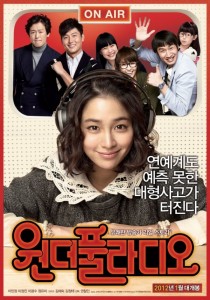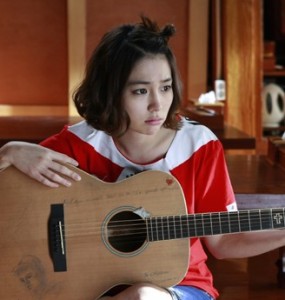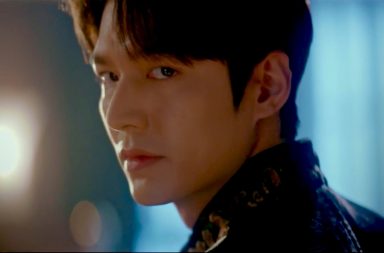 Wonderful Radio is a 2012 romantic movie starring Lee Min-jung and Lee Jung-jin about an ex-girl group member and her radio show. Due to low ratings, female lead Shin Jin-ah’s show needs a boost and Lee Jae-hyeok is sent there to help her figure things out. Jae-hyeok’s grumpy, ice-cold personality and Jin-ah’s bad temper clash in the studio; which, needless to say, means that they’ll grow fond of each other. In so many ways, Wonderful Radio attempts to be a 2-hour long K-drama, compressing multiple plotlines into one single movie.
Wonderful Radio is a 2012 romantic movie starring Lee Min-jung and Lee Jung-jin about an ex-girl group member and her radio show. Due to low ratings, female lead Shin Jin-ah’s show needs a boost and Lee Jae-hyeok is sent there to help her figure things out. Jae-hyeok’s grumpy, ice-cold personality and Jin-ah’s bad temper clash in the studio; which, needless to say, means that they’ll grow fond of each other. In so many ways, Wonderful Radio attempts to be a 2-hour long K-drama, compressing multiple plotlines into one single movie.
Spoilers ahead.
Wonderful Radio features the crazy princess with a big heart and a complicated family background. Jin-ah was a former member of Purple, the it-group of its time, which disbanded because of her. Later though, we find out she sacrificed her career for the sake of her best friend. Her love interest is a cold guy who acts like a cool, know-it-all dude from the beginning, but shows a more sensitive side. There’s also a secondary character, her manager, Dae-geun, who’s in love with her, and the arrogant lady, Mi-ra, who tries to take away everything she has. Sound familiar?
As a non-avid drama watcher and someone who bonds deeply with the fast-forward button when she happens to become interested in one, Wonderful Radio was a confirmation of all the aspects that prevent me from enjoying K-dramas. So to get things out of my system, here is a list of my problems with dramas and this movie:
1. No matter what Pantene ads tell you, full and thick is not always the best formula.
The movie has a handful of plots that entwine and ultimately lead nowhere. You have the manager, who was a fan of Purple, being too afraid to show his feelings for Jin-ah, but then he pairs up with Nan-sol. This story, though, never reaches a real conclusion. Two people come to sing for the radio show and we get to know their story — which again, leads nowhere. Another story line — one that is perhaps more worthy of attention — is the disbandment of Purple. In-seok finds her father beating his wife and tries to stop him, but accidentally kills him in the process. This topic had a lot of potential, but it patters out very quickly.
Most of K-dramas suffer from the same syndrome, with the exception that they have more time to thoroughly develop otherwise useless plots: a pretext to make the characters come together, some other people to buzz around them and enough pitiful events to fill the episodes. In this case, all these plots prevent the movie from evolving. The main stories are terribly constructed and it leaves you with no impression whatsoever. I can’t say I felt for Jin-ah and all her conflicting emotions. To compensate for the lacking sub-plots, the situations were over-dramatized and the characters tried so hard to convince us of their feelings,  but the effect was the reverse: I didn’t feel a thing. Which leads me to my next point:
but the effect was the reverse: I didn’t feel a thing. Which leads me to my next point:
2. Shake things up a bit!
Stereotypes and repetitiveness are, to me, the core of all problems in K-dramas. What proves bothersome is not necessarily a type of character, a situation or a set of moral values that irritate the watcher, but the fact they have very little variations. The apparent douche with a soft heart? The innocent, self-sacrificing girl? Criticizing vanity or conceit by vilifying the second female lead? The friendzoned guy who never stood a chance? Purity, naivety, selflessness and pity as values? How many times can you use these things?
3. “Tearjerker” is not a legitimate movie genre
I don’t consider pity to be a value. Compassion or empathy, perhaps, but not pity. So when Jin-ah came with her unresolved father issue, I was almost prepared to roll my eyes. These movies or dramas need to stop relying so much on the audience pitying the characters. Flashbacks from past tragedies don’t justify one’s diva-esque behavior in the present. It adds the illusion of depth, but it ultimately fails to be as complex or as profound as the producers want it to be. I feel like neither this movie nor dramas play enough with the actual personality of a character, or with the quality rather than the quantity of events they have gone through. Plus, making a scene with Titanic-type music where the characters cry rivers cheapens the overall quality of the drama and it’s that type of second-hand sentimentalism that’s just too hard to digest.
4. How exactly do people build relationships without communication?
Girl likes boy and boy likes girl — one shows it and one doesn’t. Then, fast forward five episodes and they’ve already established this deep connection where they have each other’s backs, though they haven’t spoken much all throughout. They have some weird unspoken policies where breathing the same air is enough for the two to become infatuated with each other. Getting locked in a room in various situations or at the workplace somehow ends up in them talking about their dysfunctional families or about that car accident. A minute after, they’d be willing to sell their souls to the devil for the sake of the other.
Granted, some of the dramas make this process more believable than others, with funny situations or more time spent with one another. But there’s no real scene or episode that smooths things from “I barely know you” to “I should leave my job and family because of you.”
It’s not to be said all K-dramas are the same, but there’s a huge chunk of them that follow the above rules. Likewise, the target audience of Wonderful Radio are K-drama fans. You can see clearly how they follow the exact structure, the cliche plots and even the same characters. However, it has some redeeming qualities: Mi-ra is not as bad as other second female characters, wrist-grabbing is almost absent, there seems to be more bonding between female characters, the relationship is somewhat sweet and Jae-hyeok is a normal guy. Plus, Boohwal‘s Kim Tae-won has a cameo, which is enough to make the movie worth watching. As for myself, I give it a rating of 1.5/5.
So what do you think? What do you think of movies like this and K-dramas? What have been your K-drama pet peeves?


